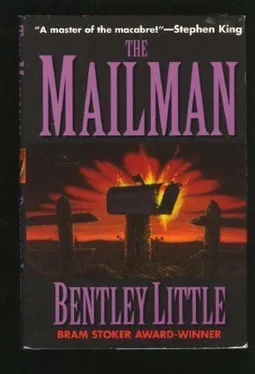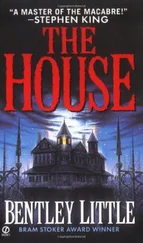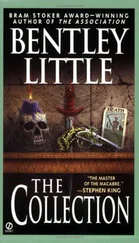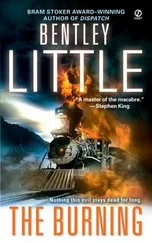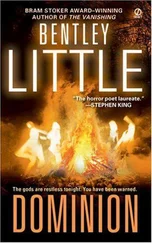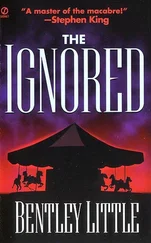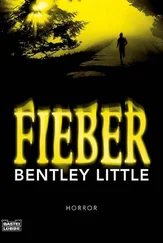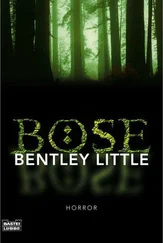The road wound past the trailer park before hitting the highway. She signaled and turned left. The town was quieter than usual. There were some cars in the Bayless parking lot, and a few campers and station wagons were on the road, going to or coming from the lakes, but the usual Monday-afternoon work rush was nowhere to be seen. She drove past the Exxon station, past the Circle K, and turned down Pine Street toward the post office.
The post office was always crowded, and today was no exception. The small parking lot was filled with old cars and dusty pickups, and seemed to be more crowded than usual. Three cars were lined up in the street, waiting for the next available parking spaces.
Rather than wait, Tritia decided to pull into the parking lot of the chiropractor's office next door and hike it in. She parked under the shade of a ponderosa and walked across the lot and around the low brick fence that separated the chiropractor's and the post office. She noticed that both the American and Arizona flag on the pole in front of the tan brick building were at half-mast and tried to recall if someone important had died on this date. She didn't think so.
Maybe someone famous had died and she just hadn't heard about it yet.
She moved up the sidewalk steps and pushed open the door, walking inside.
The swamp cooler on the roof of the post office had lowered the interior temperature but raised the humidity, so the trade-off was just about equal. The line inside was long, stretching from the counter, through the double doors, into the lobby next to the P.O. boxes. Howard Crowell, the postmaster, was at the counter, and Tritia saw immediately that he was wearing a black armband. She felt a sinking in the pit of her stomach, an instinctive intuitive reaction. She got into line behind Grady Daniels, who, for once in his life, was standing completely silent, completely still, unmoving.
He turned around to face her. "Shame," he said soberly. "It's a damn shame."
"What is?"
"Ronda," he said.
"What happened?"
"You didn't hear?"
She shook her head.
Grady lowered his voice. "Blew his brains out this morning. With a shotgun."
The postmaster looked dazedly up as the customer he had been helping turned to leave. "Next."
Tritia kept her eyes on Howard as she moved forward in line, feeling strangely cold. The postmaster's eyes were red and watery, his cheeks flushed, and it was clear that he had been both shocked and deeply hurt by the tragedy.
His voice, ordinarily loud and boisterous, was a subdued whisper, and his hands shook as he handed out stamps and change. Bob Ronda had been not only his employee but his best friend, and it was a rare Saturday night that the two of them were not seen at The Corral, listening to the country swing of the Tonto Trailbiazers, downing a few cool ones, and discussing the fate of the world. It was no secret that Howard's wife had left him two years ago, though he continued to insist that she was in Tucson attending to her invalid mother, and since that time, he and Ronda had been nearly inseparable. Ellen, Ronda's wife, had even complained that he spent more time with Howard than he did with her.
The line continued to move forward until she and Grady were at its head.
"Next," the postmaster said.
Grady moved forward. "I need to pick up my mail," he told the postmaster.
Tritia 'seyes were caught by a sign taped to the front of the counter:
"Mail will be delivered on Mondays, Wednesdays, and Fridays until a new postal carrier is appointed. The post office will temporarily be open on Tuesdays and Thursdays only. Sorry for any inconvenience."
Next to the sign was a funeral notice for Bob Ronda.
"How long's it going to be before you hire a new mailman?" Grady asked.
"I'm not going to be hiring one," the postmaster said. "Themam office in Phoenix holds an open enrollment once a year and they do the hiring. They're going to appoint someone. I called in this morning and put in an application for a new carrier, but it'll probably be a few weeks before they send someone down."
"It's a damn shame what happened to Ronda," Grady said. "A damn shame."
Howard nodded silently.
Grady got his mail, waved good-bye, and Tritia moved to the front counter.
"How are you, Howard?" she asked kindly, putting her hand on his.
He shrugged, his eyes blurry and unfocused. "As well as can be expected, I guess."
"I didn't hear until now. It's -- it's hard to believe."
"Yeah."
"Bob just didn't seem . . . I mean, it didn't seem like he'd do something like that."
"That's what I been telling people all day. I can't believe he killed himself. People always say that when something like this happens, but usually there are reasons. A guy gets divorced, his wife dies, he loses his job. But there's nothing. I was just over at Bob's house last night, and me and him and Ellen sat down, had a good dinner, some good talk. Everything was normal. He wasn't depressed at all. He wasn't happier than usual or sadder than usual or more talkative or less talkative. There was nothing out of the ordinary. He hadn't been fighting with Ellen, 'cause when they fight me and him always go out and get something to eat instead of staying to home." He shook his head, looking down at the counter for a moment, then he looked up at her and tried to smile.
The effect on his grief-stricken face was oddly gruesome. "Anyway, what can I do for you?"
"I just came to deliver a letter and to buy a book of stamps."
"A book of stamps it is," Howard said, reaching under the counter and placing the stamps before her.
She paid him the money, then gave his hand a small squeeze. "If you need anything just call," she said. "Anytime."
He nodded tiredly. "Will do."
She stepped away from the counter. Behind her, she heard the postmaster's dazed voice. "Next."
2
The funeral was well-attended. Almost everyone in town knew Bob Ronda on a first-name basis, and almost everyone liked him. The cemetery was packed and many of the latecomers were forced to stand outside the wrought-iron gates on the side of the small hill. Bob had never been a churchgoing man, and Ellen had decided to have the entire service conducted outside at the gravesite. She stood next to the preacher, dressed in a simple black dress, staring down at the ground. A wilted wet hanky was clutched in her right hand, and she twisted it absently between her fingers. Rumor had it that she had nearly gone crazy when she'd found her husband's body, screaming and yelling, tearing apart the house, even ripping off her own clothes, and that Dr. Roberts had had her heavily sedated ever since. Looking at her now, supported on both sides by her grown sons, Doug could believe it.
The newspaper account of the mailman's suicide had been sketchy and general, a polite glossing over of the facts in deference to the survivors, but in a town the size of Willis news sometimes traveled through quicker and more efficient channels than the press, and by noon the day after, nearly everyone had heard the full story. Apparently, Ronda had gotten out of bed before his wife had awakened, had walked into the garage for his sawed-off shotgun, and had gone into the bathroom. There he had taken off his clothes, stretched out in the tub, placed the tip of the shotgun in his mouth, and blown a hole through his brain. The blood and bone and tissue had splattered against the tile behind him and was dripping into the tub by the time Ellen had run in.
There had been no note.
There were other versions of the story. One version, one in which Doug put no credence, said that Ronda had sat on the shotgun, greasing it, placing it to his asshole and blowing out his insides. Another said that he had shoved the barrel deep into his eye socket, putting out his eye before pulling the trigger.
Читать дальше
